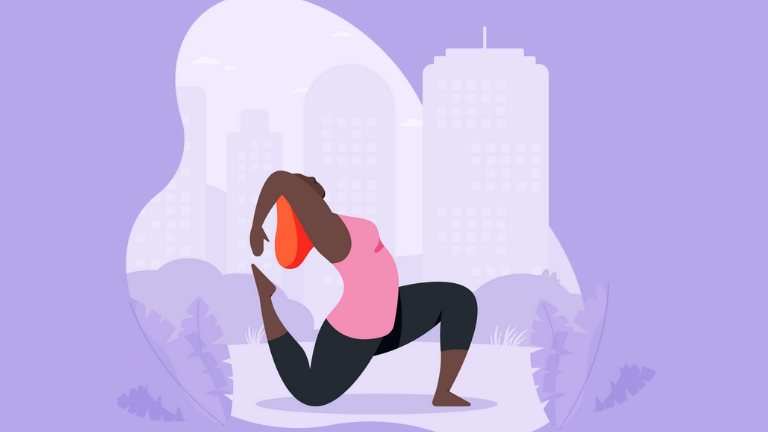Less stress, fewer worries, and the ability to live in the moment more often. Mindfulness is often presented as the magical remedy to our busy, “always-on” lives. But what does it involve in practice?
We’re always running, jumping, flying, diving and falling. Then we pick ourselves up and start the whole process all over again. To put it another way: We’re extremely busy. In a hurry. Constantly looking to the future. Surrounded by endless stimuli. Always in action mode.
It seems to have become our normal way of life, but humans weren’t really designed to live at this pace. And that means that many of use end up with concentration problems, restlessness, a short fuse, fatigue, disturbed sleep, high blood pressure, (chronic) pain, and a whole host of other stress-related symptoms.
Why Mindfulness?
An engine that’s always running will eventually overheat. If you don’t remember to charge your phone, it will stop working. That all sounds totally logical, but we all have a tendency to think we can just keep pushing through. Considering we live such busy lives; mindfulness is particularly important.
Mindfulness reduces stress hormones and tension in your body. It also gives your brain the chance to recover. People who regularly practice mindfulness are more adaptable to change, have better memories, and are better at dealing with turbulent emotions. Mindfulness is a rewarding investment in your quality of life, although it definitely takes time and patience to get the hang of it.
What does mindfulness involve?
Mindfulness is a way of focusing your attention so that you become fully aware of the experience you’re having in the present moment. OpenUp Psychologist Jasmijn Eerenberg explains: “When you practice mindfulness, you’re not thinking about the past or looking towards the future. You’re giving your full attention to what’s happening in the here and now. You observe what comes up, but try to avoid making any judgements. You don’t let yourself get swept up in the stories your brain likes to make.”
Mindfulness has its origins in psychotherapy, first appearing in the United States in 1979 thanks to molecular biologist Jon Kabat-Zinn, who developed the method. Basically, mindfulness is a life philosophy that can be taught, for example in the form of a standard eight-week program. Using a variety of practical exercises and meditations, you can start practicing mindfulness at any time of day.
How Does Mindfulness Work in Practice?
Mindfulness is the term for a wide range of skills that allow you to focus your attention with openness, curiosity, kindness and flexibility. So, how do you do that?
“First and foremost, you need to give yourself time and not set the bar too high,” advises Jasmijn. “Start small. Like with any skill, you need to keep practicing if you want to become and remain proficient. You don’t have to meditate for hours a day; you can train your attention simply be spending a few minutes each day focusing on what is going on around you.”
In this sense, mindfulness is more of a way of life. Jasmijn: “When we talk about mindfulness training, sometimes we’re referring to formal meditation exercises, such as observing your breathing or scanning your body. But there are endless ways you can practice mindfulness. For example, you could try taking an attentive bite of your meal, or paying attention to your surroundings when you ride your bike.”
What Can You Do Today to Become More Mindful?
It all comes down to awareness and practice. Because practice makes perfect. But that’s not easy when you have a head full of thoughts that can often be pretty persistent.
Jasmijn: “The OpenUp mindfulness consultations are a great and accessible way to start. They allow you to experience and practice mindfulness under the guidance of your psychologist or a lifestyle doctor.”
To wrap things up, Jasmijn wants to share some practical tips you can use to get started today. Try these exercises every day for the next week and see what mindfulness can do for you:
Three minutes of deep breathing
Every day at a set time, do this exercise: Focus on your breathing for three minutes.
Give your full attention to a daily activity
Pick one activity in your daily routine, for example brushing your teeth, walking up the stairs, drying off after a shower, washing your hands, etc., and do this activity with extra attention for a week.
Eat mindfully
Give your full attention to the first bite you take of each meal, engaging all your senses. This means you can’t be reading the newspaper, looking at your phone, watching TV or already thinking about your next bite.
Catch yourself when you’re thinking negative thoughts
For a week, become extra aware of your top three most common automatic negative thoughts. Identify them (“this is one of those”) and give them a label (“it’s just a thought”).
Write in your gratitude journal
At the end of each day, reflect back on “three good things about your day”, and be grateful for them. Before bed, write down three positive events that happened that day. Reflecting back on positive events at the end of each day makes you more aware of the good things in life while they’re happening.
Want to know more about the mindfulness consultations at OpenUp? Click here.





